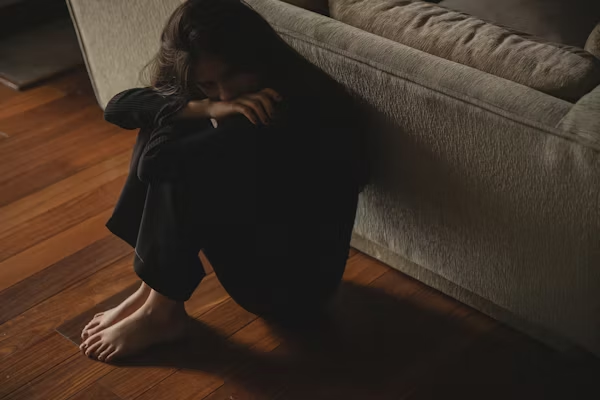🌟 Introduction
Have you ever walked into a room and felt like all eyes were on you? Like your every word would be judged? That’s not just “being shy” — that could be social anxiety.
Social anxiety isn’t about being introverted or reserved. It’s a real and often paralyzing fear of social situations. It can affect relationships, careers, and even simple daily tasks.
But here’s the good news: social anxiety is treatable. With the right steps, support, and mindset, you can learn to feel confident in your own skin — even in a crowd.
This step-by-step guide will walk you through how to understand and overcome social anxiety one manageable step at a time.
🔍 Recognizing Social Anxiety
Common Signs and Symptoms
- Fear of being judged or embarrassed
- Avoiding eye contact
- Racing heart or sweating in social settings
- Avoiding group activities or public speaking
- Replaying conversations over and over
When Does Shyness Become a Problem?
Shyness is normal. But when it interferes with your life, keeps you isolated, or causes extreme stress in everyday situations — it’s more than just shyness. That’s social anxiety disorder (SAD).
🧠 The Psychology Behind Social Anxiety
Fear of Judgment and Rejection
At the core of social anxiety is a fear of being judged, rejected, or humiliated. It’s rooted in a deep need to be accepted — something all humans crave.
Evolutionary Perspective
Historically, being part of a group meant survival. Rejection from a tribe? That could mean death. While we’ve evolved, our brains still see social rejection as a serious threat.
⚡ What Triggers Social Anxiety?
Common Situations That Cause Fear
- Meeting new people
- Speaking in public
- Eating or writing in front of others
- Job interviews
- Answering questions in class
Internal vs External Triggers
- Internal: Self-criticism, perfectionism, overthinking
- External: Crowds, authority figures, unfamiliar places
Knowing your triggers helps you prepare and manage them better.
💥 The Impact of Social Anxiety on Daily Life
Relationships, Careers, and Confidence
- Struggling to make or keep friends
- Missing job opportunities
- Avoiding promotions or leadership roles
- Feeling “stuck” in life
Emotional Toll and Isolation
Social anxiety can cause loneliness, depression, and low self-worth. The more you avoid, the more your world shrinks.
🧭 Step 1: Accept and Name the Fear
Awareness as the First Step
You can’t change what you don’t acknowledge. Admit that you have social anxiety, and remind yourself — it doesn’t define you.
Why Denial Keeps You Trapped
Pushing the fear away only gives it more power. Naming your fear reduces its control.
Say it out loud: “This is social anxiety. And I can work through it.”
🗣️ Step 2: Challenge Negative Self-Talk
Identifying the Inner Critic
Social anxiety thrives on thoughts like:
- “I’ll say something stupid.”
- “They’re all laughing at me.”
- “I’m not good enough.”
Reframing Unhelpful Thoughts
- Replace “I’ll embarrass myself” with “I’m human. Everyone makes mistakes.”
- Use affirmations like “I am enough” and “I have the right to take up space.”
📶 Step 3: Start Small and Expose Yourself Gradually
The Power of Baby Steps
You don’t have to give a TED Talk tomorrow. Start by:
- Making small talk with a cashier
- Asking a coworker how their day is going
- Making a phone call instead of texting
Using the Exposure Ladder Technique
Make a list of feared situations, from least to most scary. Face one at a time — each win builds courage for the next.
🎯 Step 4: Learn and Practice Social Skills
Building Confidence Through Repetition
Social skills are just that — skills. Which means they can be learned, practiced, and improved.
Scripts and Practice Tools
Try role-playing conversations with a trusted friend or in front of a mirror. Use YouTube or podcasts to study natural dialogue.
🧘 Step 5: Master Relaxation Techniques
Breathing and Grounding Exercises
When anxiety hits, breathe deeply:
- Inhale for 4 seconds
- Hold for 4
- Exhale for 4
- Hold for 4 (Box breathing)
Ground yourself by focusing on your senses: 5 things you see, 4 you can touch, etc.
Mindfulness and Body Awareness
Meditation apps like Headspace and Calm can help you stay present and reduce stress over time.
🤝 Step 6: Seek Support (You’re Not Alone)
Therapy and Support Groups
Cognitive Behavioral Therapy (CBT) is proven effective for social anxiety. A trained therapist can help you break thought patterns and build coping strategies.
Online Communities and Hotlines
- 7 Cups for anonymous support
- Reddit forums
- Talk to someone you trust — even just saying “I struggle with this” is a big win.
📓 Step 7: Track Progress and Celebrate Wins
Journaling Your Journey
Write down what worked, what didn’t, and how you felt after each social interaction. This builds self-awareness and momentum.
Rewarding Yourself for Facing Fears
Celebrate progress — not perfection. Did you make a phone call? Speak up in a meeting? That’s worth acknowledging!
🌈 Real-Life Stories of Overcoming Social Anxiety
Inspiration and Motivation
People like Emma Stone and Adele have spoken publicly about their struggles with social anxiety — and their triumphs.
You’re not broken. You’re human.
What Others Did Differently
Most say the turning point was when they stopped avoiding and started facing fears step by step.
🧰 Tools and Resources to Help You
Apps, Books, and Online Programs
- Books:
- The Shyness and Social Anxiety Workbook by Martin Antony
- Dare by Barry McDonagh
- Apps:
CBT Techniques and Worksheets
You can find free CBT worksheets at Therapist Aid to guide your thought and behavior patterns.
✅ Conclusion
Social anxiety isn’t a flaw — it’s a challenge. And challenges are meant to be faced and overcome.
With small, intentional steps and the right support, you can build confidence, make connections, and live fully — without fear calling the shots.
You don’t have to do it all today. Just take the next right step. You’ve got this.
❓ FAQs
1. Can social anxiety go away on its own?
It may lessen with age, but active steps like therapy, exposure, and mindset shifts are usually needed for true change.
2. Is medication required to treat social anxiety?
Not always. Some benefit from SSRIs or beta-blockers, but many manage well through CBT and lifestyle strategies.
3. What’s the difference between introversion and social anxiety?
Introverts enjoy solitude. People with social anxiety fear judgment or rejection in social situations.
4. How long does it take to overcome social anxiety?
It varies. Some see progress in weeks, others take months. The key is consistency, self-compassion, and patience.
5. Can I still succeed in life if I have social anxiety?
Absolutely. Many successful people have battled it. With the right tools, you can thrive — on your own terms.



